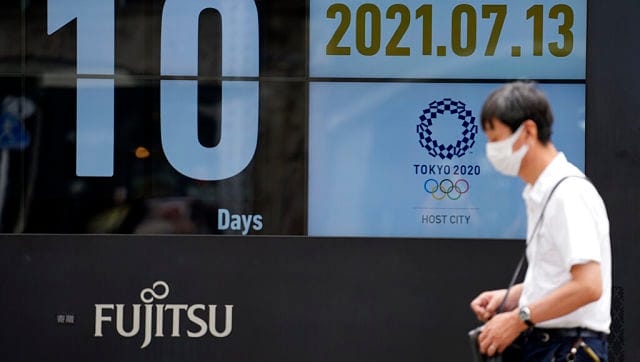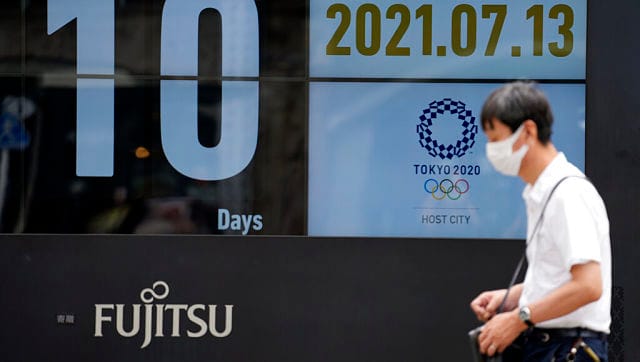Firstpost Explains: Safety measures, COVID-19 outbreak — how organisers plan to hold Tokyo Olympics 2020 amid pandemic-Sports News , Firstpost
Some answers to look at ways Tokyo Olympics organisers will try to prevent infections among thousans of athletes.

A man wearing a face mask against the spread of the coronavirus walks in front of a countdown calendar showing 10 days to start Tokyo 2020 Olympics Tuesday, 13 July, 2021, in Tokyo. AP
Tokyo: Tokyo’s Olympics will be like no other Games, with the spectre of coronavirus hanging over every part of the event, and organisers determined to prevent an outbreak.
hanging over every part of the event, and organisers determined to prevent an outbreak.
Here’s a look at some of the ways they’ll try to prevent infections among some 11,000 athletes, and what will happen if cases do emerge at the Games, which open 23 July.
What safety measures are there?
The latest rulebook for athletes and sports officials is 70 pages long, and the requirements start before they get to Japan.
Athletes must test negative for the virus twice within 96 hours of travel, and again when they land.
They’ll be tested daily while in the country, and they have to leave the Olympic Village within 48 hours of their competition ending.
And there won’t be any soaking up the atmosphere: they aren’t allowed anywhere except their accommodation and competition venues, with a ban on using public transport.
Masks will be mandatory, even on the medal podium, with exceptions only for eating, sleeping, training and competing.
What about vaccines?
Olympic officials say 85 percent of the athletes and teams staying in the Village will be vaccinated. Getting jabbed is not a requirement, but has been strongly encouraged.
The anti- Coronavirus rules will be the same for those taking part in the Games, whether they’re vaccinated or not.
rules will be the same for those taking part in the Games, whether they’re vaccinated or not.
Tokyo 2020 has organised vaccinations for 38,000 officials, volunteers, local media and airport staff, among others.

People wearing face masks chat before parting at a train station in Tokyo, Friday, 9 July, 2021. A state of emergency began Monday, 12, 2021 July, in Tokyo, as the number of new cases is climbing fast and hospital beds are starting to fill just 11 days ahead of the Tokyo Olympics. AP
What happens if there’s an infection?
Athletes will be given daily saliva antigen tests, and if they come back positive or unclear, they’ll have a follow-up saliva PCR test, which is more sensitive.
If that test is positive, they’ll have a nasal and throat swab PCR test. A third positive result will mean the athlete is out of the Games.
They’ll have to isolate or be hospitalised, with no chance of rejoining the competition.
What if you’re a close contact?
Things are a bit more complicated for “close contacts” of an infected person.
The term only applies to people who have spent 15 minutes or more within one metre of the infected person without wearing a mask.
That might include a roommate, or a dining companion but probably not a tennis partner, for example.
Those considered close contacts will face a nervous wait to hear whether they are judged safe to continue participating in the Games.
Rulings will be made “case-by-case” and consider whether the close contact is likely to spread infection.
If close contacts are allowed to compete, they may face additional restrictions, including being moved to a separate room and eating meals alone.
What if someone gets really sick?
Medical staff and facilities are key at any Games, but the stakes are higher given the pandemic.
Organisers say there will be some 7,000 medical staff, including doctors and nurses, but have declined to specify the number of beds available.
The push to find these resources has been controversial in Japan, given a recent surge in infections that stretched the local healthcare system.
To head off that criticism, the International Olympic Committee has pledged to bring additional medical staff from outside to reduce pressure on resources.
Is everyone insured?
Olympic participants from overseas, including athletes, team officials and media, are required to have insurance that will cover medical treatment and repatriation.
Olympic rulebooks specify that the insurance must include cover for COVID-19 .
.
Before they enter Japan athletes will need to sign a “written pledge” to obey coronavirus restrictions, and take responsibility for their trip.
restrictions, and take responsibility for their trip.
“Despite all the care taken, risks and impacts may not be fully eliminated,” warns the Olympic playbook, which details anti-virus measures.
“Therefore you agree to attend the Olympic and Paralympic Games at your own risk.”
For all the latest Sports News Click Here
For the latest news and updates, follow us on Google News.

